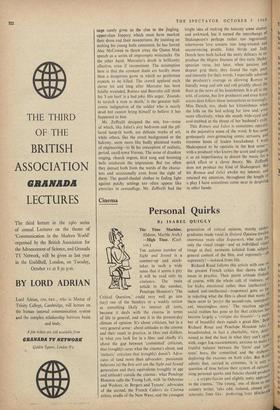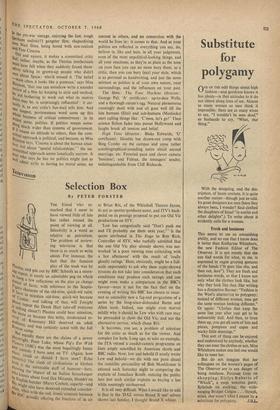leaves to others to discover when they began to be
so. The antiquary shows you how things were, and leaves their present existence to be examined by others. Hence the former is more useful, the latter' more curious. The former receives the thanks of all mankind, the latter of that valuable part, the virtuosi. Gibbon stood on the threshold of a revolution.
tions: the professional historian and the histori- cal source. Roman history played its part, for it ou
was Niebuhr's sensational announcement that the received tradition about the early history of Rome was totally unreliable, which, as much as anything, elevated the fact to its new high status as the main object of historical inquiry. It was no good reading the old historians or the new theologians and philosophers, in so far as the latter had taken over the writing of history, if their narrative and their generalisations rested on wrong data. Wie es eigentheh gesehehen war ('how it really happened')—that dictum of Ranke's became and has remained the dominant creed of historians, with consequences which excessive familiarity tends to conceal.
One need only supplant Fielding's 'the
*THE DECLINE ANO F.NI I 01. THE ROMAN EMPIRE.
By Edward Gibbon, abridged by D. M. Low. (Chatto and Windus. 36s.) There is no need to be invidious and call
the roll of the exceptions, save one, Sir Ronald Syme's history of the period 60 Pc to AD' 14t, now re-issued in Oxford's new paperback series. The reviewer was not far wrong who wrote in the Spectator in 1939 that this 'is the best book on Roman history that has appeared for many years.' This is still true in 1960. In techr virtuosity. the book meets the most rigorous mands of the most hardbitten fact-fetishist. But its importance lies in its subject, and in its seriousness. Sir Ronald understands the period as one of revolution in the strict sense, of 'a violent transference of power and property... . . The composition of the oligarchy of govern- ment therefore emerges as the dominant theme of political history.' He is writing not for honto Wiens but for homo politicus. His views are Strongly held, stated 'quite nakedly, without hedging,' and the keystone is 'a deliberately
. critical attitude towards Augustus.' It is a partisan work; so is every good piece of histori- cal writing. . . We come back full circle to Polybius' ques- tion, 'Can anyone be so indifferent or idle. The idle reader cannot read history. Polybius considered his theme to be worth a work in forty
THE HISTORY OF ROME. By Theodor Mommsen. abridged by C. Bryans and F. I. R. Hcndy. (Peter Owen. 30s.--first published in 1888. now re-issued from the old plates but called a, 'new edition' on the dust-jacket.) :THE ROMAN REvoi.tri ioN. By Ronald Spit. (O.U.P., 15s.)
Penelope
Mortimer
SATURDAY LUNCH WITH THE BROWNINGS Her new short stories: 'written with
the ease and economy which amounts to brilliance' ELIZABETH JANE HOWARD, The Queen.
`There is no writer since Angus Wilson ... who so accurately defines and analyses the British at bay in respectable anguish'
KENNETH ALLSOP, Daily Mail. 16s.
*
John Blofeld
PEOPLE OF THE SUN
`It is hard to believe that any book exists telling us more about the people of Siam' NORMAN LEwis:Bookman. Illus. 25s.
Only Thucydides's history of the Peloponnesian
War comes to mind, but there may be one or two others. The Roman Revolution, too, though re-
latively small in scale, is a large, packed book.
That is how it must be. Bishop Bossuet could write a universal history in very few pages be- cause he was writing theology, not history. He told his readers what the truth was, exemplify- ing it by a few facts and events. The historian works the other way round: he narrates, moving from one concrete datum of experience to the next. The importance of the experiences, together with their mass and their inter-connections, evokes the general ideas. No short history of a civilisation can really achieve this, however skilful its author. Mr. Michael Grant§, for example, creates vivid images, particularly of those aspects of Rome which he detests, such as the brutality of the gladiatorial games or the irrationality of astrology and the more orgiastic cults. To accomplish this in 300 pages he must work to the evidence, not from it, and he is com- pelled either to ignore whole chunks of Roman history outright or, at best, to sum them up dogmatically.











































 Previous page
Previous page